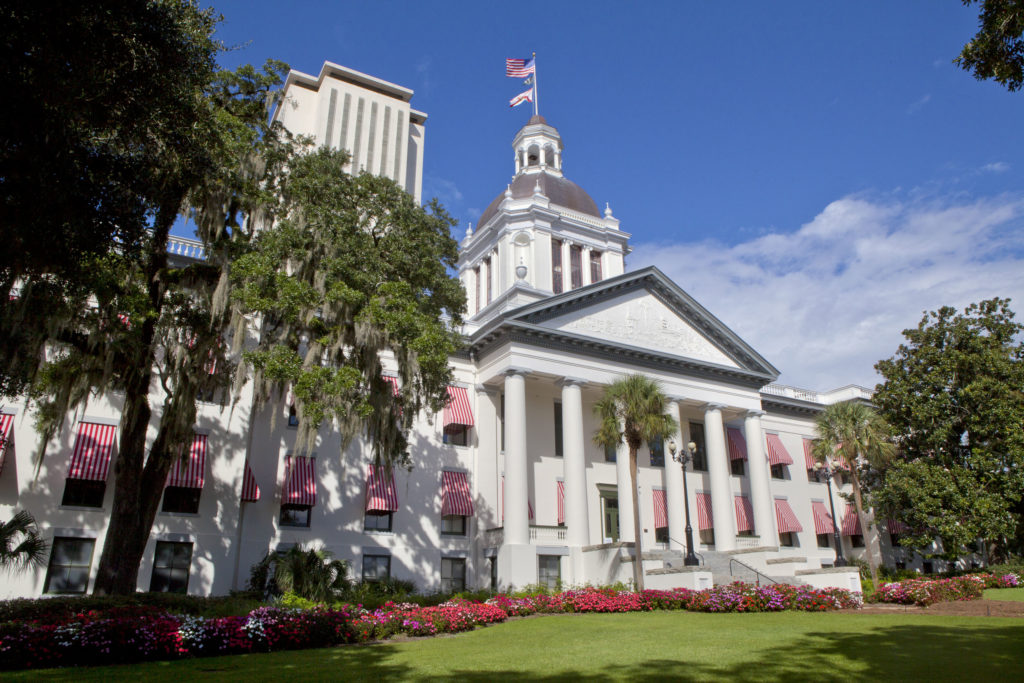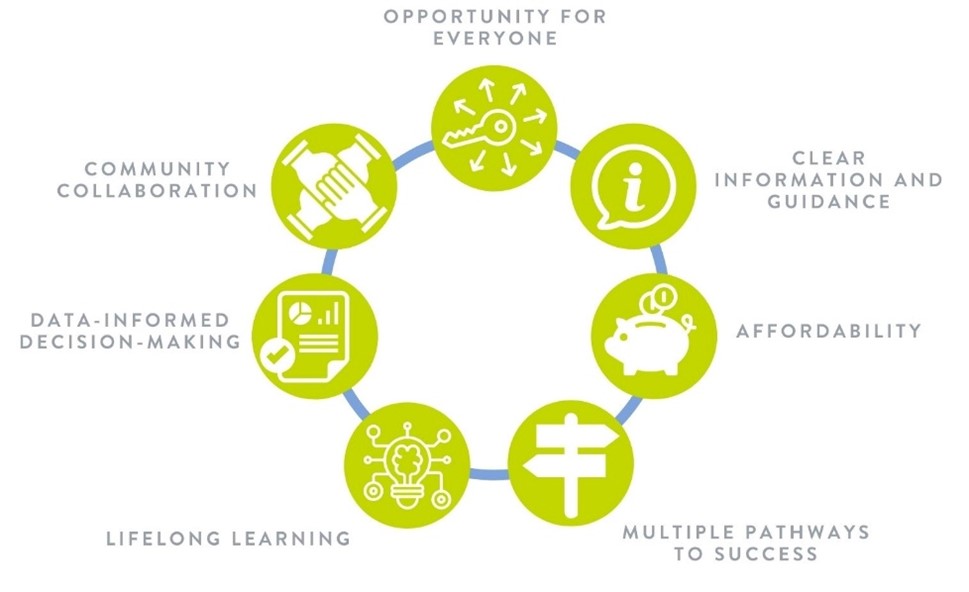2023 FLORIDA LEGISLATIVE SESSION PREVIEW
Career and technical education (CTE) expansion, articulation pathways, financial aid,
and additional legislation impacting Florida’s students

Introduction
Florida’s 2023 Legislative Session is scheduled to start on Tuesday, March 7th, with new leadership in place after the November 2022 elections: Senate President Kathleen Passidomo (R – Naples) now occupies the upper chamber, while House Speaker Paul Renner (R – Palm Coast) leads the way in the Florida House of Representatives. The committee weeks leading up to this year’s legislative session show both chambers remaining committed to workforce education, while also looking to strengthen current programs and practices already in place.
Many of the proposals before the legislature in the next 60 days will impact the state’s path to achieving a Talent Strong Florida. With over 1,500 bills filed between both chambers, there are several policy initiatives poised to impact postsecondary access and attainment for Florida students.
This preview outlines bills as of March 1, 2023 and includes some of the top budget priorities from the Governor’s office and legislative proposals to watch this session. All legislation will be categorized with the following icons to connect the proposed policy with FCAN’s Seven Conditions for Success.

- SB 196/HB 141 — Guidance Services on Academic and Career Planning
- SB 526/HB 595 — Determination of Residential Status for Tuition Purposes
- SB 240 – Education
- SB 244 — K-12 Teachers
- SB 750 — Articulation Agreements
- SB 826 — Standard High School Diploma Award Requirements
- HB 303 — Florida Bright Futures Scholarship Program
- HB 459 — Education
Budget
Policymakers will have another historic budget year. According to the Florida Office of Economic and Demographic Research, Florida’s economic forecast shows a +2.9% percent change in GDP for the 2021-2022 fiscal year (FY). Furthermore, the latest economic estimating conference predicts additional growth for the 2022-23 FY with a projected GDP percent change of +2.0%.
Governor Ron DeSantis has recommended a record-breaking $114.8 billion budget for FY 2023-2024 FY, a $15.1 billion increase over last year. The Framework for Freedom budget outlines the Governor’s priorities for the coming year including tax cuts, salary increases for state employees and law enforcement, and historic funding for education.
The Governor continues to support the goal for Florida to become number one in the nation for workforce education by 2030, outlined in Executive Order 19-31, by proposing funding to programs that promote credential completion, student retention, and career and technical education (CTE). Highlights include:
- $1.5 billion in state operating funds for the Florida College System (FCS) and $3.1 billion for the State University System (SUS).
- Increased funding for the Pathways to Career Opportunities Grant Program ($20 million), with $5 million to develop a new Teacher Registered Apprenticeship Program.
- $25 million to continue the work of the Open Door Grant Program, expanding the affordability of workforce training for Florida students.
- Performance-based Incentives for CTE students attending school district career technical centers and Florida Colleges (increased to $26.5 million).
- Performance funding for the FCS and SUS maintained at $30 million and $560 million, respectively.
- $125 million in continued funding for two programs implemented in 2022 to enhance Florida’s nursing workforce: (1) the Prepping Institutions, Programs, Employers and Learners through Incentive for Nursing Education (PIPELINE) program, and Linking Industry to Nursing Education (LINE)
- Increased funding to $24.6 million for the Florida Postsecondary Academic Library Network which provides essential library and virtual learning resources to the state’s public colleges and universities.
- Funding for Bright Futures Scholarship Program at $614.5 million and the Florida Student Assistance Grant (FSAG) at $286 million.
- Maintaining the tuition freeze at Florida’s colleges and universities, allowing Florida to remain one of the states with the lowest tuition rates in the country.
Policy
SB 196/HB 141 – Guidance Services on Academic and Career Planning
Bill Sponsors: Senator Shevrin Jones (D – Miami Gardens) and Representative Kristen Arrington (D – Kissimmee)
Senate Bill 196 and House Bill 141 amend the current requirements district school boards have for academic and career planning for students. Under these bills, students and their parents would be notified about career and professional pathways, work-based learning opportunities, advanced placement (AP) and dual enrollment courses available at the beginning of each school year, along with guidance counselor contact information. The bills consider that this information must be disseminated to parents and families in a culturally competent manner by providing it in a language that is understandable to all parties. Similar bills were filed last year, with Rep. Arrington working to pass this in the House for another year.
SB 526/HB 595 – Determination of Residential Status for Tuition Purposes
Bill Sponsors: Senator Rosalind Osgood (D – Plantation) and Representative Jervonte Edmonds (D – West Palm Beach)
Senate Bill 526 and House Bill 595 are identical bills that address residential requirements for tuition purposes. This bill would allow an individual who has spent time in a correctional institution in Florida to apply that time spent to meet the requirements for establishing residency. The bills also add that a dependent child may use their parent/s time in a correctional facility towards establishing residency.
SB 240 – Education
Bill Sponsors: Senator Travis Hutson (R – St. Augustine)
Senate Bill 240 is a comprehensive bill aimed at addressing work-based learning opportunities, current funding programs, workforce connections to in-demand careers, and CTE in the public school system. Highlights of the proposed bill include:
Workforce Education Program Funding
- Expands the Open Door Grant program, originally modeled after Virginia’s Tech Express Program, to all workforce programs, including associates and bachelor’s degrees at FCS institutions. The bill would allow funds to be used for things including tuition and fees, but also transportation and housing.
- Allows school district technical centers and FCS institutions to select any three programs for the Moneyback Guarantee.
- Creates a new tiered model for distribution of the CAPE workforce incentive funds based on the average wages of the highest-earning occupation.
- Amends the Pathways to Career Opportunities Grant Program to include a new teacher apprenticeship program and give the Department more flexibility in administering the program, which is designed to expand the number of apprenticeships in the state.
- Appropriates $100 million for the creation of the Workforce Development Capitalization Incentive Grant Program to create or expand current CTE programs and pathways.
Career and Technical Education Expansion and Work-based Learning Opportunities
In an effort to provide additional work-based learning opportunities to students, the bill:
- Directs each district school board to ensure all high school students have access to at least one work-based learning opportunity.
- Provides an opportunity for middle school students to continue CTE into a connected program in any district high school through controlled open enrollment.
- Modifies credit requirements for a standard high school diploma. Students may now opt to earn one credit in career and technical education to satisfy the credit required in fine or performing arts. Additionally, students who participate in Florida Future Farmers of America or other CTE student organizations would be eligible to apply that experience to satisfy an elective or work-based learning credit.
- Tasks the DOE with convening a workgroup to compile best practices on middle to high school CTE pathways. The workgroup must also work to identify three math pathways in K-12 by aligning current math offerings to postsecondary education programs and careers.
- Removes the six-year training and experience requirements and allows any individual with a relevant industry certification to serve as an adjunct teacher without passing a subject area exam.
- Adds educational institutions, local workforce boards, community or faith-based organizations, or associations to the list of approved apprenticeship sponsors.
- Requires middle and high school to update their career plan annually.
- Authorizes OPPAGA to conduct a review on Florida’s current statewide articulation agreements for career and technical education programs.
Other Provisions
- The bill would allow school district technical centers to offer college credit, which can currently only be offered by FCS and SUS institutions. In previous years, Rep. Robinson (R – 71) filed bills to allow district career centers to offer an associate in applied science or an associate in science degree to individuals who graduated from a licensed practical nursing degree from the same district center. SB 240 expands upon this effort.
- This section also updates provisions related to the Master Credential List (MCL). It requires the Credentials Review Committee (CRC), under CareerSource Florida, to include agricultural industry certifications. It also establishes a one-year phase out period for any credential on the MCL that no longer meets the established framework of quality.
- The bill adds responsibilities to local workforce development boards. Each local workforce development board chair must create an education and industry consortium to provide community-based information to assist the board in decision-making for program delivery.
SB 244 – K-12 Teachers
Bill Sponsors: Senator Alexis Calatayud (R – Miami)
Senate Bill 244 modifies current programs and creates new incentives for Florida’s current and aspiring teachers. Under this bill, postsecondary students who participate in a state-approved teacher preparation program would be eligible for the State University System’s “Buy one – Get One” tuition fee waiver. Additional new funding programs are covered below.
Dual Enrollment Educator Scholarship Program
SB 244 creates the Dual Enrollment Educator Scholarship Program, a new program first highlighted in Governor DeSantis’ proposed Framework for Freedom budget. The program would assist high school teachers in obtaining the graduate education and credentials to deliver dual enrollment coursework to students. Scholarship recipients must agree to remain in the district for three years, teaching at least one general education core dual enrollment course per year. The Governor’s budget proposes $3.5 million for this scholarship program.
Teacher Apprenticeship Program and Mentor Bonus
The Teacher Apprenticeship Program creates an alternative pathway for prospective teachers. Governor DeSantis has recommended $5 million for this new program, also proposed in his 23-24 FY budget. To be eligible, apprentices must have an associate degree with a minimum 3.0 GPA, pass a background check, and receive a temporary certificate. Apprentices will work under a mentor teacher for their first two years on the job, after which they are eligible to apply for a professional teaching certificate.
Mentor teachers who support the apprentices, similar to a journey-worker, in this program must have at least seven years of teaching experience and be “highly effective.” Teacher mentors would also be eligible for a bonus or supplement for their participation. The Framework for Freedom budget proposes $4 million for the mentor bonuses.
Heroes in the Classroom Bonus Program
The Heroes in the Classroom Bonus Program provides bonuses for retired veterans and first responders who become teachers. Recipients must commit to teaching in a school district or charter school for a minimum of two years.
SB 750 – Articulation Agreements
Bill Sponsors: Senator Alexis Calatayud (R – Miami)
Senate Bill 750 expands Florida’s current 2+2 articulation agreements in multiple areas. Under this bill, the Articulation Coordinating Committee (ACC) must convene a workgroup with faculty from career, FCS, and SUS institutions to identify at least eight statewide 2+2 agreements for associate of science to bachelor’s degree programs. In addition, each state university must also work with one or more FCS institutions to establish one local 2+2 articulation agreement.
The bill also aims to increase the teacher pipeline in the state by requiring the ACC to identify transfer pathways for education paraprofessionals and individuals who hold a child development associate credential to gain a bachelor’s degree.
The bill requires that credits from FCS AA transfers must first be used to satisfy institutional and program-specific requirements, before they are applied as elective credits toward a student’s degree program.
Lastly, the bill describes the details and approval process of a new FCS associate in arts specialized transfer degree. These degrees are specifically for FCS institution students that require supplemental coursework in order to transfer.
SB 826 – Standard High School Diploma Award Requirements
Bill Sponsors: Senator Linda Stewart (D – Orlando)
Similar to Senate Bill 698 from the 2022 Legislative Session, this addresses FAFSA completion in Florida. Beginning with incoming students in the 9th grade during the 2024-25 school year, SB 826 makes the completion of the Free Application for Federal Student Aid (FAFSA) a requirement to earn a standard high school diploma. This bill provides conditions for students or parents to exempt themselves from the requirement. In order to opt-out, parents (or the student if they are 18) must submit a letter to the school district declining FAFSA completion.
HB 303 – Florida Bright Futures Scholarship Program
Bill Sponsors: Representatives Jennifer Canady (R – Lakeland) and Fabian Basabe (R – North Bay Village)
House Bill 303 would expand the eligibility requirements for the Florida Bright Futures Scholarship Program to students with an AP Capstone designation from College Board. The bill outlines the six required AP courses: Seminar, Research, one English, one art, history or social sciences, one math or science, and the last is student choice. The bill also clarifies that the AP Capstone designation is not a replacement for the requirements to receive a standard high school diploma. Similar proposals have been filed in the past in order to expand Bright Futures eligibility.
HB 459 – Education
Bill Sponsors: Representative Mike Giallombardo (R – Cape Coral)
House Bill 459 addresses computer science course offerings in high school. First, HB 459 would allow two credits from these courses in high school to replace the foreign language credit requirement at SUS institutions.
HB 459, like the previous bill, expands eligibility requirements for the Florida Bright Futures Scholarship Program. This bill would now add that a student participating in a DOE approved apprenticeship program may be eligible for Bright Futures funding.
This bill amends CS/HB 461 (2022) that allowed students to replace the volunteer hour component of the Bright Futures Program with work hours. HB 459 would allow students to apply a combination of both, rather than choosing one or the other, toward their eligibility. The bill provides additional testing options for students to apply for the Gold Seal Vocational Scholars award including the Armed Services Vocational Aptitude Battery and ACT WorkKeys assessments.
Other relevant bills:
In addition to the above legislation, members have filed several bills that address various financial aid and scholarship programs. The following section includes relevant funding bills.
Financial Aid, Scholarships, and other Funding Sources for Students
- Senate Bill 550 and House Bill 339 expand current eligibility requirements for educational benefits for spouses or dependent children of a disabled or deceased servicemember to include servicemember disability, death, and children of prisoners of war or those missing in action.
- Senate Bill 644 and House Bill 683 create the Historically Black Colleges and Universities (HBCU) Matching Endowment Scholarship Program, which would allow Florida’s four HBCUs to match up to $500,000 each into an endowment that whose accumulated interest would fund for student scholarships.
- Senate Bill 900 and House Bill 463 create the Groveland Four Scholarship Program for current African-American residents of Groveland and descendants of victims of the Groveland Four event from July 1949. Maximum annual funding for this award is $6,100, administered by DOE, and may be used at career centers and FCS and SUS institutions.
- Senate Bill 1190 creates the “Step into Success Workforce Education and Internship Pilot Program,” a three-year program for foster youth to gain necessary workforce and employability skills and transition to independent living.
- House Bill 191 creates the Academic Success of Pregnant Female Students who are Victims of Sexual Abuse Grant Program, established under the DOE.
- House Bill 1019 would provide educational grants to formerly ABLE-eligible institutions that meet specific requirements.
Additional Bills
Senate Bill 274 and House Bill 517 are aimed at addressing Florida’s current nursing shortage. The ACC would create a workgroup charged with establishing a system to determine course and clock hour equivalencies for medical training and service for relevant military positions. Senate Bill 630 and House Bill 465 are companion bills aimed at increasing the per student funding allocation for the Open Door Grant Program in order to bolster student participation from $3,000 to $7,000 or $9,000 respectively. HB 465 also states that the Commissioner of Education would have final approval of the MCL, created by the CRC. Senate Bill 732 and House Bill 845 would create the Collegiate Purple Star Campuses to assist military students in their postsecondary educational journey. Senate Bill 992 and House Bill 961 change the K-12 education drop-out age from 16 to 18 years old.
Senate Bill 1142 and House Bill 697 create the Workforce Education Facilities Grant Program, housed under the DOE. This grant is provided to school districts on a one-time basis to fund additions and upgrades to facilities that are used for the delivery of qualified workforce education programs. Senate Bill 1168 and House Bill 445 eliminate the awarding of a certificate of completion for high school students after July 1, 2023. Senate Bill 1120 requires the State Board of Education (SBE) to establish a policy on transfer credit acceptance for K-12 students who earn grades and credits from a licensed or non-licensed school or provider.








